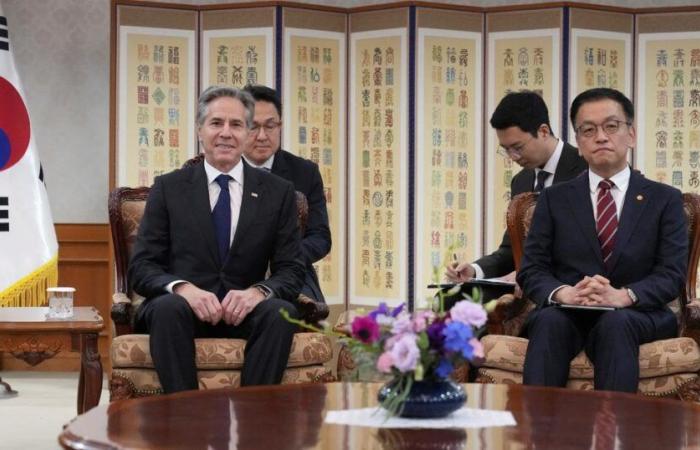
The US Secretary of State also said on Monday that Moscow would “share advanced space and satellite technologies” with North Korea, which has sent thousands of soldiers to fight alongside Russia against Ukraine.
American Secretary of State Antony Blinken began a farewell tour in Seoul this Monday, January 6, before Donald Trump's arrival at the White House, in the hope of preserving the stability of his alliance with South Korea despite the political chaos that has gripped this country.
As if to recall the stakes of this alliance, while Antony Blinken spoke with South Korean officials, North Korea launched its first missile of the year. The intermediate-range ballistic missile was fired from the Pyongyang region and crashed into the Sea of Japan, according to the South Korean military.
This shot, the first in three months, comes two weeks before the inauguration of Donald Trump, who during his previous mandate had led very personal attempts at rapprochement with North Korean leader Kim Jong Un.
“Russian military equipment”
During a press conference with his South Korean counterpart Cho Tae-yul, Antony Blinken condemned the launch, “another violation of multiple United Nations Security Council resolutions”according to him. The Secretary of State also said that Moscow would “share advanced space and satellite technologies” with Pyongyang, which sent thousands of soldiers to fight alongside Russia against Ukraine.
“The DPRK already benefits from Russian military equipment and training. Today we have reason to believe that Moscow intends to share advanced space and satellite technologies with Pyongyang.he declared, using North Korea's official acronym, the Democratic People's Republic of Korea.
Like American Ambassador to the UN Linda Thomas-Greenfield in December, Antony Blinken also affirmed that, according to the United States, Russia “maybe about to” to formally recognize the status of North Korea as a nuclear power.
“Unwavering commitment” to defending Seoul
Mr. Blinken's visit comes amid a political crisis in South Korea. The country's president, Yoon Suk Yeol, was impeached by Parliament on December 14 after attempting to impose martial law and muzzle Parliament by sending in the army. He has since been holed up in his residence in Seoul with his bodyguards, who are preventing investigators from coming to arrest him for his coup.
While the vociferations of Yoon Suk Yeol's supporters demonstrating in front of his residence are clearly audible from the hotel where he is staying, Antony Blinken refrained from any comments on the internal situation in the country. In the morning he met with interim President Choi Sang-mok, in office for barely a week after the successive dismissals of Yoon Suk Yeol and Prime Minister and interim head of state Han Duck-soo.
Antony Blinken stuck to the usual statements on “unfailing commitment” of Washington to defend South Korea, and spoke with Mr. Choi “how the two sides will work together to strengthen bilateral cooperation and trilateral cooperation with Japan”according to a statement from the State Department.
Before his December 3 coup, now-deposed President Yoon Suk Yeol was considered President Joe Biden's darling for his pro-US positions. He delighted Washington when, seeking to turn the page on decades of mutual distrust, he approached Japan, the United States' other major ally in East Asia. Antony Blinken is also expected in Tokyo on Monday, before ending his tour in Paris.
The Shadow of Donald Trump
In 2023, Yoon Suk Yeol, a 64-year-old conservative, held a historic summit with Joe Biden and then-Japanese Prime Minister Fumio Kishida at the presidential residence of Camp David, during which the three countries promised to strengthen their intelligence cooperation on North Korea. On Monday, Acting President Choi's office said in a statement that Seoul remains committed to “Principles and agreements of the Camp David summit”.
The political crisis in South Korea, the world's fourth largest economy, comes at a time when an administration comes to power in Washington that risks being much less favorable than the current one. During his last presidential campaign, Donald Trump threatened to force South Korea to pay $10 billion a year for the presence of American troops on its soil, almost ten times what it currently pays.





